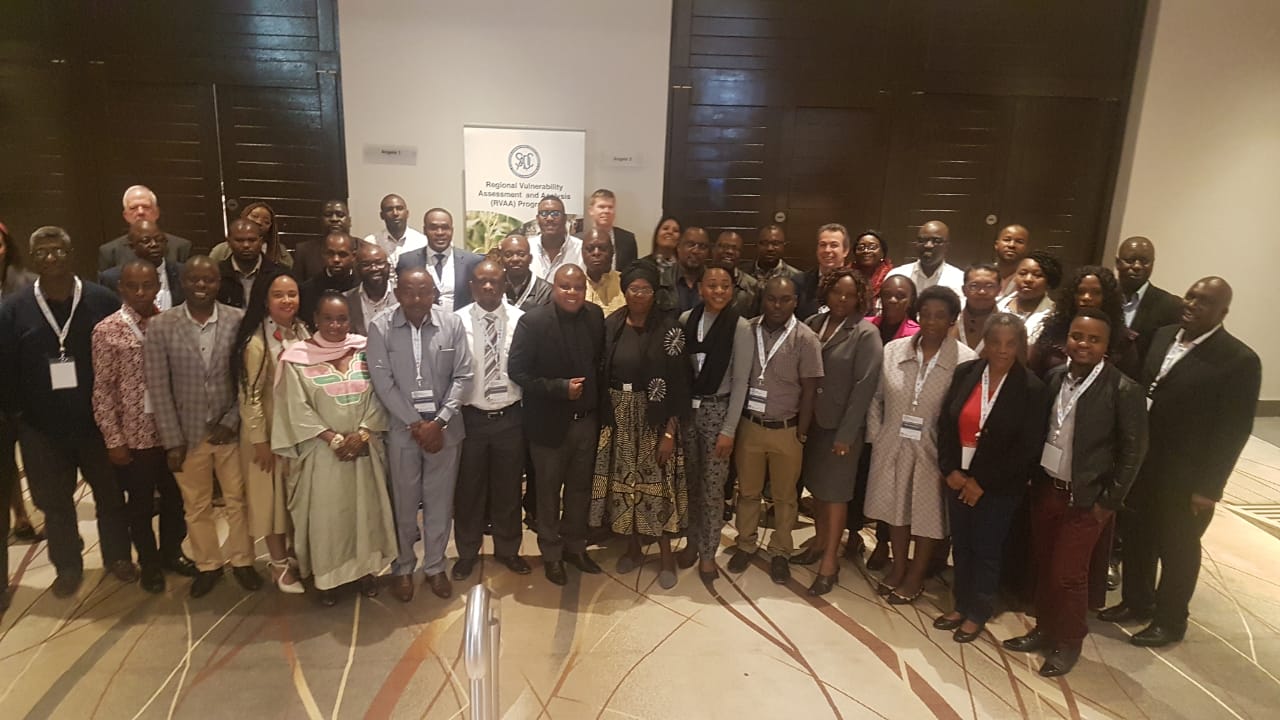Meeting to consolidate the regional food and nutrition security outlook for 2019
The Southern African Development Community (SADC) Regional Vulnerability Assessment and Analysis (RVAA) programme’s annual dissemination meeting has opened in Windhoek, Namibia with a call to strengthen and prioritise the mainstreaming of climate change into vulnerability assessments and analysis.
The meeting that took place from 01 – 05 July 2019, has brought together over 60 representatives of National Vulnerability Assessment Committees (NVACs) of SADC Member States, the SADC Secretariat and development partners.
The meeting noted that although NVACs are already contributing to the national global reporting system and processes within the United Nations Framework Convention on Climate Change (UNFCCC), the is importance that the RVAA Programme promotes a systematic approach in addressing the vulnerability issues in the region.
The 2018/19 agricultural season in Southern Africa started nearly a month late and was characterized by extended dry spells and drought.
Speaking during the opening session, Ms. Anastasia Amunyela, the Deputy Director for Policy, Disaster Risk Management Directorate of the Government of Namibia said the SADC region is experiencing frequent climate-related disasters, including drought and flooding. She said to address the impact of climate change, SADC Member States have put together various initiatives both at national and regional level, “Currently, the government of Namibia is responding to drought by distributing food relief and agricultural inputs, as well as the provision of water to the affected population. The response followed the President of Namibia’s declaration of drought emergency on 06 May 2019”, she said.
Parts of western and central Southern Africa received their lowest seasonal rainfall totals since 1981.
Following heavy rainfall from Cyclone Idai and Kenneth, central Mozambique, southern Malawi, and eastern parts of Zimbabwe were affected by widespread flooding that destroyed lives, crops, and infrastructure.
Cumulatively, these factors have affected agricultural production and the livelihood of the population.
In this regard, it is critical for SADC to strengthen and prioritize the mainstreaming of climate change into vulnerability assessments and analysis.
Dr. Sithabiso Gandure, a climate change researcher and consultant, said the historical and current data generated by NVACs can be integrated into climate change impact and vulnerability assessments – a key component of the national climate change communications, “Climate vulnerability assessments inform the development of climate change policies and strategies as well their monitoring and evaluation,” she said. Dr. Gandure also called upon the NVACs to participate and become part of the climate change coordination mechanisms, such as inter-ministerial steering committees or task forces.
The main objective of the dissemination meeting was to discuss and consolidate the results of the 2019 vulnerability assessments and analysis of SADC Member States into the SADC Regional Synthesis Report on the State of Food and Nutrition Security and Vulnerability in Southern Africa, 2019. The Report provides a regional outlook on the state of food and nutrition security and vulnerability and contains recommendations for short and long-term planning.
It is the reference document for the SADC Council of Ministers Meetings on food and nutrition security and vulnerability in the region which also informs the annual SADC Heads of State and Government Summit.
The SADC Regional Synthesis Report on the State of Food and Nutrition Security and Vulnerability in Southern Africa, 2019 will be approved on 05 July 2019 by the RVAA Programme Steering Committee. The Steering Committee comprises of Permanent Secretaries of ministries responsible for NVACs of Member States. The SADC Secretariat will release the Report on 09 July 2019.
The dissemination meeting will also discuss and review the vulnerability assessment approaches of the SADC Member States, including the best practices and experiences, the implementation and sustainability of the 2017-2021 phase of the RVAA Programme; the climate outlook and the interaction between vulnerability and climate change.
The SADC RVAA Programme aims to strengthen the capacity of Member States to undertake and utilise the vulnerability assessments and analysis (VAA) in informing policy and programming. The Programme provides technical guidance, coordinates and promotes the harmonisation of VAA approaches in the region.
The 2017-2021 phase of the RVAA is prioritising the integration of climate change approaches and methodologies into vulnerability assessments and analysis to inform policies, strategies, and programmes.
In 2013, the Programme conducted a pilot study on projected climate change and livelihoods in Botswana and Mozambique. The study demonstrated that livelihoods and climate data could be combined, depending on data availability, to project impact scenarios for the future.
The 2017 – 2021 phase of the RVAA Programme is funded by the United Kingdom Department for International Development (UK DFID) and the Swiss Agency for Development and Cooperation (SDC) and implemented with technical support from the United Nations World Food Programme (WFP) Regional Bureau for Southern Africa and Landell Mills.






